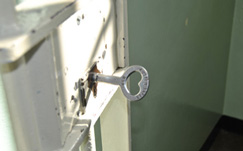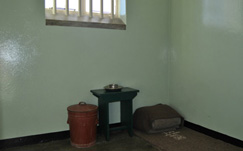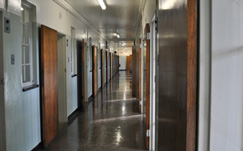Robben Island to turn to solar power
14 May 2015
Robben Island, one of the world's top tourist attractions, will soon generate its
power from solar panels.
The island prison, which once held Nelson Mandela and struggle stalwarts Walter
Sisulu and Ahmed Kathrada, among others, will be a pilot site for the Department of
Tourism. It plans to roll out solar power to botanical gardens, South African
National Parks and world heritage sites.
Delivering his department’s budget vote today, Tourism Minister Derek Hanekom
said the installation of solar power at the island would take place during the current
financial year.
"The exciting part of the retrofitting programme is that it contributes towards our
countrywide effort to reduce the electricity demand and to start shifting towards
efficient energy use and renewable energy use.
"We will be introducing this component of the incentive programme on a pilot basis
this year and it will involve the introduction of
renewable energy at mainly our
botanical gardens, at South African National Parks and at some of our world
heritage sites. It will also include some of our community-based projects,
particularly those that don't have immediate access to the grid," he said.
The retrofitting programme is part of the R180-million Tourism Incentive
Programme, which is aimed at advancing transformation in the sector, growing
enterprises and developing tourism attractions. As part of the retrofitting, the
department will assess the needs of these establishments and then install
photovoltaic panels.
Local procurement
Hanekom said the panels would be made using technology that was South African
intellectual property and the bulk of the components would be local. "One of the
pilot sites will be Robben Island, and this will be done this year.
"Robben Island as we speak depends entirely on diesel generated electricity. We
will shift them completely from
diesel generated electricity to solar generated
electricity," he said.
While R180-million would be spent on the pilot phase of the Tourism Incentive
Programme, an additional R368-million had been budgeted for the following years,
said the minister.
During the 2015/16 financial year, the programme would support tourism
enterprises to access new markets by subsidising some of the costs of attending
travel shows, as well as costs associated with being graded by the Tourism Grading
Council.
Tourism had contributed 9.4% to the country's gross domestic product over the past
year, Hanekom added. The sector's value chain now supported one in every 10 jobs
in the country.
International arrivals
"Growth in international tourist arrivals was recorded at 6.6% between 2013 and
2014. The 9.5 million visitors welcomed into South Africa last year contributed to
creating a better life for all South Africans.
"The Department of
Tourism will leverage the 2015/16 budget of R1.8-billion to
create job opportunities and implement programmes that will take the sector
forward in an inclusive and sustainable manner."
His department had set an ambitious target of attracting 12 million international
tourists arrivals by 2017/18 and increasing domestic holidaymakers from 2.8 million
in 2014 to 4.1 million by 2020.
"With this level of growth, the department [is] on track to achieve the National
Development Plan's target of creating 225 000 jobs within the sector by 2020," he
added.
"About 54% of the budget will be allocated to South African Tourism for
international and domestic marketing. An amount of R100-million has been ring-
fenced for domestic marketing this year."
Source: SAnews.gov
 The door to Nelson Mandela's prison cell on Robben Island. (Image: Lorraine Kearney)
The door to Nelson Mandela's prison cell on Robben Island. (Image: Lorraine Kearney)
 Nelson Mandela's cell on Robben Island. (Image: Lorraine Kearney)
Nelson Mandela's cell on Robben Island. (Image: Lorraine Kearney)
 The prison block where Nelson Mandela was imprisoned on Robben Island. (Image: Lorraine Kearney)
The prison block where Nelson Mandela was imprisoned on Robben Island. (Image: Lorraine Kearney)





